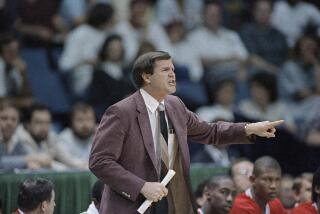Schnellenberger Making Progress at Louisville
- Share via
LOUISVILLE, Ky. — In two years at the helm of the University of Louisville football team, Howard Schnellenberger has lost a lot of games.
But the man who gained national fame with a five-year turnaround at Miami is not losing patience.
“My attitude is good,” he said during his third Louisville team’s pre-season practice. “I feel good about this football team.”
It was December 1984 when Schnellenberger shocked the football world with the news he was returning to the town where he grew up to take over a football program that had sunk to the bottom of NCAA Division I-A. Before he was hired, many had advocated Louisville downgrade its program because the team could not compete in the top division.
He arrived with high hopes and a history of winning, from high school to All-American seasons as a player at Kentucky, then in a coaching career that included stops at Alabama and Kentucky and pro positions with the Colts, Rams and Dolphins.
Schnellenberger downgraded those hopes when he saw his future team in action during 1985 spring drills, saying he knew Louisville would not soon be another Miami.
“There were five Division I players on that team,” he recalls. “We’ve got 50 to 55 kids who can play Division I football now.”
But even three good recruting years is not enough to do more than make Louisville respectable, he said.
“Where we’ve got 50 to 55 kids who can play Division I, they’ve got 95,” he said, referring to the nation’s elite programs. “And where we have eight seniors, they’ve got 17 or 18.”
Behind his bushy mustache he grins: “But we’re much closer. The first year we were not in the football game against most of the people we played.”
The process of adding football to Louisville’s athletic fame is one that should take “15 years,” the 53-year-old Schnellenberger said. “But I don’t have 15 years, so we’ll have to do it more quickly.”
After 2-9 and 3-8 seasons his first two years, he said Louisville should rise above the .500 mark this year, both on the strength of a stronger team and a weaker schedule. Five of the Cardinals’ first six games are at home, three against lightly regarded opponents.
A winning season also would help the confidence of his youngest team to date (about half the 95-man roster are freshmen) and improve Louisville’s chances of recruiting talented players, he said.
“Once you show you can compete, a lot of things come easier,” said Schnellenberger, whose Miami team captured the national title three years after climbing above .500. “Each of our recruiting classes has been a marked improvement. We go out and recruit the best kids in America. We rate them, by position, best to least best. We find now the ones we’re getting are getting closer to the top.”
Schnellenberger left Miami after a national championship season in 1983 for a promised job with a new USFL franchise. Troubles came, the franchise did not, and before the 1984 season opened Schnellenberger was a coach looking for a team.
Louisville lured him with a five-year, million dollar package that rivals that of coaches at the nation’s top-ranked programs. Such a committment to spend big money will push Louisville along the road to success, he said.
In the meantime, there are games to be played, many to lose.
“Losing is consistent with building a program,” he said. “I’m still happy to be here. As our football team improves, there’ll be more pleasure in living in Louisville.”
Perhaps justifiably, there is still an attitude of skepticism in Louisville about Schnellenberger’s promise to turn the Cardinals into contenders.
It was no different early in Miami, recalls a sportswriter who covered Schnellenberger’s early teams.
“They had gone through a revolving door of coaches,” said Jim Martz of the Miami Herald. “There was justifiable skepticism.”
More to Read
Go beyond the scoreboard
Get the latest on L.A.'s teams in the daily Sports Report newsletter.
You may occasionally receive promotional content from the Los Angeles Times.










